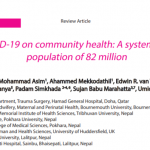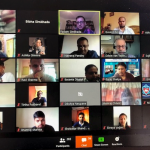 Last week a team of researchers from Bournemouth University and the University of Huddersfield published a blog on the Healthy Newborn Network on ‘Pregnancy and COVID-19: Lessons so far‘ .[1] The blog highlights that since COVID-19 is a new disease, we are still learning how it spreads most commonly, what the best prevention measures are and how it affects different groups of people including pregnant women. The blog mentions particularity the excellent contribution made on the topic by the Royal College of Obstetricians and Gynaecologists, Royal College of Midwives and Royal College of Paediatrics and Child Health, with input from the Royal College of Anaesthetists, the Obstetric Anaesthetists’ Association, Public Health England and Health Protection Scotland in the online publication: Coronavirus (COVID-19) infection and pregnancy – guidance for healthcare professionals: Version 8 – 17 April 2020
Last week a team of researchers from Bournemouth University and the University of Huddersfield published a blog on the Healthy Newborn Network on ‘Pregnancy and COVID-19: Lessons so far‘ .[1] The blog highlights that since COVID-19 is a new disease, we are still learning how it spreads most commonly, what the best prevention measures are and how it affects different groups of people including pregnant women. The blog mentions particularity the excellent contribution made on the topic by the Royal College of Obstetricians and Gynaecologists, Royal College of Midwives and Royal College of Paediatrics and Child Health, with input from the Royal College of Anaesthetists, the Obstetric Anaesthetists’ Association, Public Health England and Health Protection Scotland in the online publication: Coronavirus (COVID-19) infection and pregnancy – guidance for healthcare professionals: Version 8 – 17 April 2020
The Bournemouth University lead on this blog is Dr. Preeti Mahato is working as a Post-doctoral Researcher in the Centre for Midwifery, Maternal & Perinatal Health (CMMPH). Preeti has conducted her PhD research in the field of maternal health, perinatal health and health services research and she has published in these areas. Prof. Padam Simkhada from the Univerisyt of Huddersfield is Visiting Professor in BU’s Faculty of Health & Social Sciences. Pasang Tamang, the lead author, is PhD student at the University of Huddersfield.

Prof. Edwin van Teijlingen
CMMPH
Reference:
- Tamang, P., Mahato, P., van Teijlingen E, Simkhada, P. (2020) Pregnancy and COVID-19: Lessons so far, Healthy Newborn Network [14 April] healthynewbornnetwork.org/blog/pregnancy-and-covid-19-lessons-so-far/
 New COVID-19 publication by FHSS academics
New COVID-19 publication by FHSS academics New FHSS co-authored COVID-19 publication
New FHSS co-authored COVID-19 publication COVID-19 online session in Nepal
COVID-19 online session in Nepal










 Beyond Academia: Exploring Career Options for Early Career Researchers – Online Workshop
Beyond Academia: Exploring Career Options for Early Career Researchers – Online Workshop UKCGE Recognised Research Supervision Programme: Deadline Approaching
UKCGE Recognised Research Supervision Programme: Deadline Approaching SPROUT: From Sustainable Research to Sustainable Research Lives
SPROUT: From Sustainable Research to Sustainable Research Lives BRIAN upgrade and new look
BRIAN upgrade and new look Seeing the fruits of your labour in Bangladesh
Seeing the fruits of your labour in Bangladesh ECR Funding Open Call: Research Culture & Community Grant – Apply now
ECR Funding Open Call: Research Culture & Community Grant – Apply now ECR Funding Open Call: Research Culture & Community Grant – Application Deadline Friday 12 December
ECR Funding Open Call: Research Culture & Community Grant – Application Deadline Friday 12 December MSCA Postdoctoral Fellowships 2025 Call
MSCA Postdoctoral Fellowships 2025 Call ERC Advanced Grant 2025 Webinar
ERC Advanced Grant 2025 Webinar Update on UKRO services
Update on UKRO services European research project exploring use of ‘virtual twins’ to better manage metabolic associated fatty liver disease
European research project exploring use of ‘virtual twins’ to better manage metabolic associated fatty liver disease